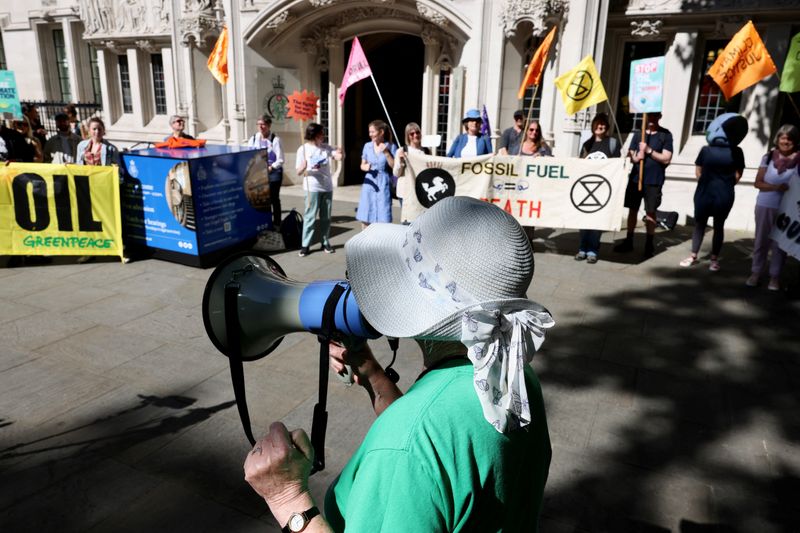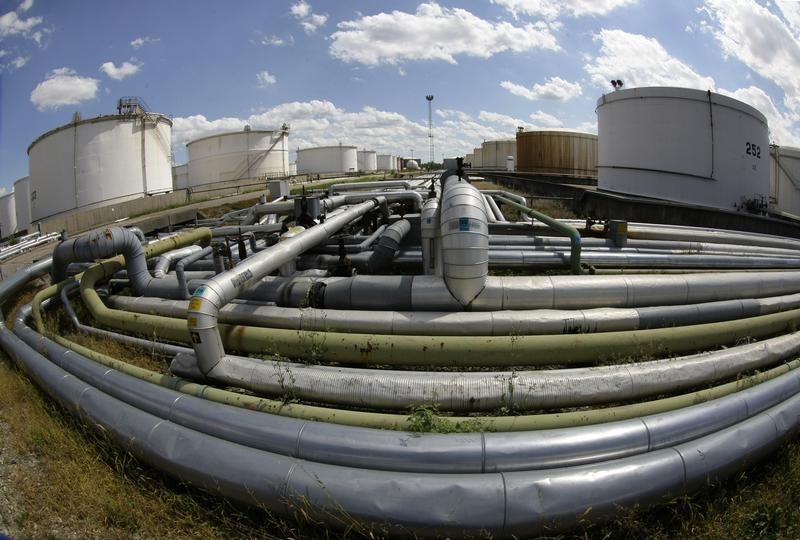By Michael Holden
LONDON (Reuters) -Planning authorities should have considered the impact of climate-warming emissions when approving an oil well near Gatwick Airport, Britain’s top court said on Thursday. This could have a profound impact on new fossil fuel projects in Britain, according to ruling activists.
Environmentalists had argued that planning permission to retain and expand the oil well site near Gatwick in London was flawed because it had not taken into account the impact of greenhouse gas emissions from using the oil.
Supreme Court justices agreed by a narrow three-to-two majority and quashed the approval of the plan, which they said was unlawful.
Although the court said councils can still approve plans even if they were likely to cause significant damage to the environment, campaigners said the landmark judgment would make it much harder for new oil, gas and coal developments to gain approval.
“This historic ruling is a turning point in the fight to stop further fossil fuel extraction projects in Britain and make the emissions cuts needed to meet crucial climate targets,” said Friends of the Earth lawyer Katie de Kauwe.
“It’s a huge boost for everyone involved in opposing fossil fuel projects.”
The campaign groups said the ruling could lead to proposals for other controversial plans, such as a new coal mine in Cumbria, northern England, and oil and gas projects in the North Sea.
“Oil and gas companies will sift through the judgment to assess the extent to which it affects future projects in Britain, and existing challenges before the courts, which had been put on hold pending the High Court’s decision,” said Tom Cummins (NYSE: ), partner at law firm Ashurst.
The government said it would carefully consider the impact of the ruling and its possible relevance to other ongoing legal proceedings.
NEW OIL DRILLING
The case concerned a 2019 decision by Surrey County Council to allow Horse Hill Developments, part-owned by British energy company UK Oil & Gas Plc (UKOG), to retain two oil wells and drill four more over a period of twenty years near the town of Horley, near Gatwick.
An environmental impact assessment (EIA) for the project examined the impact of the construction, production and decommissioning of the site, but did not assess the impact of the emissions that would result from the use of the refined oil.
The Weald Action Group (WAG), an umbrella organization for local groups campaigning against oil and gas extraction in south-east England, estimates this amounts to more than 10 million tonnes of CO2 emissions.
A campaigner acting on behalf of WAG launched a legal challenge against the plan’s approval on the grounds that the EIA was flawed, but this was dismissed by both the High Court in London and subsequently the Court of Appeal.
However, the Supreme Court rejected this, saying it was inevitable that combustion emissions would occur from the refined oil.
“There is no dispute that these emissions, which can be easily quantified, will have a significant impact on the climate,” said George Leggatt, one of three Supreme Court justices who agreed with the appeal.
“The only question is whether the combustion emissions are effects of the project at all. It seems clear to me that this is the case.”

UKOG’s CEO Stephen Sanderson said the company’s focus had shifted from oil and gas to underground hydrogen storage, but added that it would work closely with local government to ensure accountability for “this retroactive change to the EIA requirements”.
The council itself said that planning permission for the oil well “still needs to be determined in due course”.


